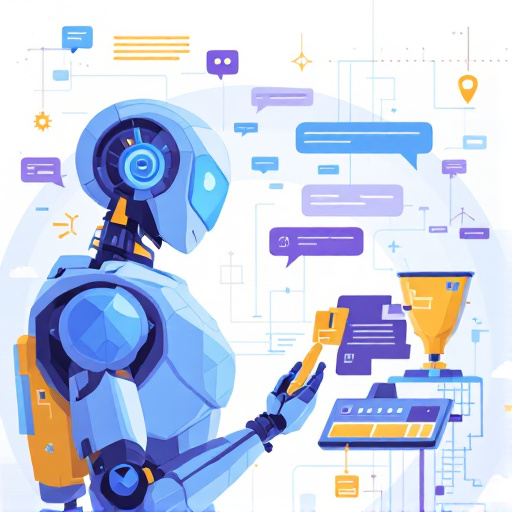Featured Articles
- "Beyond the Grades: How TikTok Trends are Shaping Modern College Admissions Strategies"
- "Crafting Your Admissions Narrative: Harnessing the Power of Personal Myths and Unique Stories"
- "How Your Social Media Footprint Can Make or Break Your College Admissions Journey"
- Navigating the Unseen: How Side Hustles Can Boost Your College Admissions Appeal
- "Unconventional Strategies: How Quirky Hobbies Can Boost Your College Application Appeal"
Unpacking the Role of AI Chatbots in Shaping College Admissions Strategies: The Future is Here!
Unpacking the Role of AI Chatbots in Shaping College Admissions Strategies: The Future is Here!
Artificial Intelligence chatbots are not only enhancing communication in various industries but are also revolutionizing college admissions strategies. This article delves into the multifaceted role of AI chatbots, examining their impacts, benefits, challenges, and future prospects in shaping the college admissions landscape.
The Rise of AI Chatbots in Education
In recent years, artificial intelligence has surged in popularity across different sectors, and education is no exception. According to a report by Market Research Future, the global AI in education market is expected to reach $25 billion by 2030, growing at a compound annual growth rate (CAGR) of 45%. Among the AI innovations, chatbots are leading the charge, providing institutions with unparalleled opportunities to enhance student engagement and streamline the admissions process.
The Basics of Chatbots
Chatbots are programs that simulate conversation with human users, particularly over the Internet. They can answer frequently asked questions, provide information, and even guide prospective students through the admissions process. Imagine a high school senior, Jane, at her kitchen table, laptop open, wrestling with questions about her application to a prestigious university. Instead of sifting through endless web pages, she types her query into a chatbot and gets an instant response. It’s like having a personal admissions assistant available 24/7!
Enhancing the Admissions Experience
Chatbots have transformed the way colleges and universities interact with prospective students. They provide immediate answers to inquiries that range from logistical questions about deadlines to specific criteria regarding scholarships. For instance, a chatbot can tell a student that the application deadline for a certain program is December 15, while also explaining the steps to apply for financial aid. This immediate availability of information helps reduce the stress and confusion often associated with college admissions.
Data-Driven Decisions
Statistics reveal just how impactful chatbots can be. A case study conducted at the University of California, Berkeley found that the application submission rate increased by 25% after the implementation of an AI chatbot. Through analyzing chat logs, institutions can gain insights into the common questions and concerns of prospective students, allowing them to refine their strategies accordingly. Essentially, chatbots not only assist students but also provide data to better tailor admission programs to student needs.
Personalized Engagement
Personalization is a key trend in modern marketing and admissions strategies. AI chatbots can learn from interactions and tailor responses based on the user’s data, preferences, and previous questions. For example, when a student shows interest in environmental science, the chatbot might suggest related programs, internship opportunities, or clubs. It’s as if the chatbot is making a personalized pitch that speaks directly to the student’s interests! The beauty lies in scalability; one chatbot can engage thousands of prospective students simultaneously.
Reducing Administrative Burdens
Admissions offices are often overwhelmed with inquiries, especially during peak application seasons. By handling routine questions and tasks, chatbots free up admissions staff to focus on more complex issues, such as evaluating applications and crafting communication strategies. How about that? Instead of answering a flood of “What’s the GPA requirement?” emails, admissions officers can concentrate on providing support to students who need personalized feedback.
The Human Touch: Finding Balance
That said, the integration of AI doesn’t come without concerns. Many fear that the use of chatbots will diminish personalized human interaction crucial in the college admissions process. After all, forming relationships is a significant aspect of navigating higher education. While chatbots can alleviate pressure from staff, institutions must find a balance where technology enhances rather than replaces personal engagement. A mixed approach—combining AI capabilities with human insight—appears to be the most effective strategy.
Inclusivity through Multilingual Capabilities
Colleges are becoming increasingly diverse, welcoming international students from various cultural backgrounds. AI chatbots can be programmed to communicate in multiple languages, ensuring that non-native speakers receive the information they need. For instance, a prospective student from Spain querying about a scholarship opportunity could interact with a Spanish-speaking chatbot. By breaking down language barriers, chatbots can foster inclusivity and expand the reach of admissions teams.
The Future of Chatbots in Admissions
As we look to the future, the potential of AI chatbots in college admissions appears limitless. With advancements in natural language processing (NLP) and machine learning, future chatbots will likely be capable of more sophisticated interactions. Instead of just answering questions, imagine a chatbot that can guide students through the entire application process, offer tailored recommendations, and even assist with interview preparation! Now, that’s a game-changer!
Case Study: Georgia State University
Georgia State University serves as a fascinating model for the use of AI and chatbots in admissions. After launching a chatbot, called Pounce, the university experienced a dramatic increase in student engagement. In just one admission cycle, Pounce had answered over 70,000 questions, directly contributing to the rise in student enrollment. This case study highlights the potential for AI chatbots to provide efficient, accessible information for students while transforming the college admissions landscape.
Overcoming Challenges of AI Integration
According to a study by the Empirical Education, one of the major challenges facing colleges when adopting AI technology is ensuring data privacy and security. Institutions must navigate strict regulations concerning personal data, particularly for minors. Adequate training and guidelines are crucial to developing ethical frameworks for chatbot interactions. Moreover, continuous monitoring is needed to keep chatbots relevant and up-to-date in addressing evolving student concerns.
Conclusion: Embracing the AI Revolution
The integration of AI chatbots into college admissions strategies represents a significant step toward modernizing the education landscape. By enhancing the student experience, offering personalized engagement, and streamlining operations, chatbots are transforming how prospective students navigate their college search. As they continue to evolve, their role will only become more critical. Educational institutions that embrace AI technology are poised to attract and retain a new generation of students and stay ahead in an increasingly competitive environment.
So, to all college admission offices out there: don’t fear the robot revolution! Embrace it! After all, the future is here—and it’s chatting you up!




